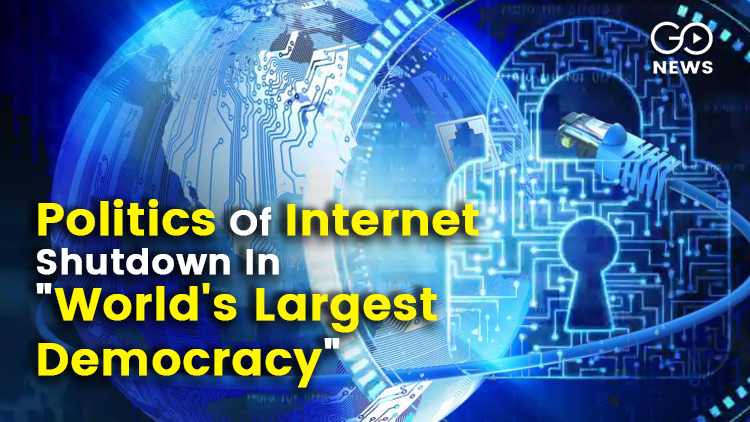Internet Still Down In Lakhimpur Kheri: India Leads World In Net Shutdowns

As the news of the violence in Lakhimpur Kheri district began circulating in the media, one of the first reactions of the administration was to promptly shut down the internet. This is hardly a new practice in India by now and neither does it ever face any serious or sustained questions either. Internet remains down in Lakhimpur Kheri and new information is not able to reach from there, including that on detained Congress leaders .
Given the iron-clad grip on the ‘mainstream media’ that dominates screens and airwaves, social media has become a powerful alternative pathway to reach audiences directly, with one’s own narrative or perspective.
Internet shutdowns are usually ordered on the basis of "public safety". However, it can also be argued that it is interested in ensuring that only ‘controlled’ narratives of its own preferred media emerge from protest hotspots rather than other viewpoints that may not be aligned to the ruling party’s interests. In 2019 during the Anti-CAA protests, the government imposed 106 shutdowns in one year alone. India is second in the world in terms of mobile subsribers but the ‘leader; in imposing internet shutdowns. Internet Shutdowns And Farmers’ Protests The Internet Freedom Foundation is a “digital liberties organization” that has taken a consistent stand against internet shutdowns. It created the hashtags #KeepItOn and #KeepUsOnline to create a momentum for this issue. It supported the farmers’ protests ever since their inception in 2020 and issued a joint statement which said: "We, the undersigned organizations and individuals, strongly condemn the internet shutdowns imposed by central and state government authorities to suppress the farmers’ protests at the borders of the National Capital Territory of Delhi”. Mentioning instances of violence and danger posed by farmers protesting on ground at the Singhu border, Gazipur border, and other places, it said: “It is against this backdrop that we raise alarm about the use of internet shutdowns by government authorities to suppress the free flow of information related to peaceful assembly and the fundamental right to protest.” It further says that there is “empirical evidence” to show that internet shutdowns can actually aggravate violence by blocking communication to organize peacefully. The heavy presence of police and paramilitary on such sites can also quell any illegal or dangerous activity, rather than depriving lakhs of people of the internet. The internet and social media are important tools in the hands of protestors. It allows them to directly state their own views and interpretation of facts on ground. It allows new information to emerge which aids further mobilization and awareness, such as the video of the Karnal SDM ordering security personnel to “break heads” of the farmers. It is significant that even during the protests against such an order and its implementation, which resulted in the death of 1 farmer from head injuries, internet services were shut off in Karnal and adjoining areas. Here are some internet shutdowns connected to the farmers’ protests:
Internet shutdowns are usually ordered on the basis of "public safety". However, it can also be argued that it is interested in ensuring that only ‘controlled’ narratives of its own preferred media emerge from protest hotspots rather than other viewpoints that may not be aligned to the ruling party’s interests. In 2019 during the Anti-CAA protests, the government imposed 106 shutdowns in one year alone. India is second in the world in terms of mobile subsribers but the ‘leader; in imposing internet shutdowns. Internet Shutdowns And Farmers’ Protests The Internet Freedom Foundation is a “digital liberties organization” that has taken a consistent stand against internet shutdowns. It created the hashtags #KeepItOn and #KeepUsOnline to create a momentum for this issue. It supported the farmers’ protests ever since their inception in 2020 and issued a joint statement which said: "We, the undersigned organizations and individuals, strongly condemn the internet shutdowns imposed by central and state government authorities to suppress the farmers’ protests at the borders of the National Capital Territory of Delhi”. Mentioning instances of violence and danger posed by farmers protesting on ground at the Singhu border, Gazipur border, and other places, it said: “It is against this backdrop that we raise alarm about the use of internet shutdowns by government authorities to suppress the free flow of information related to peaceful assembly and the fundamental right to protest.” It further says that there is “empirical evidence” to show that internet shutdowns can actually aggravate violence by blocking communication to organize peacefully. The heavy presence of police and paramilitary on such sites can also quell any illegal or dangerous activity, rather than depriving lakhs of people of the internet. The internet and social media are important tools in the hands of protestors. It allows them to directly state their own views and interpretation of facts on ground. It allows new information to emerge which aids further mobilization and awareness, such as the video of the Karnal SDM ordering security personnel to “break heads” of the farmers. It is significant that even during the protests against such an order and its implementation, which resulted in the death of 1 farmer from head injuries, internet services were shut off in Karnal and adjoining areas. Here are some internet shutdowns connected to the farmers’ protests:
- 26th January 2021: Singhu, Ghazipur, Tikri, Mukarba Chowk, Nangloi and adjacent areas by central government
- 27th- 30th January 2021: Shutdown in 17 out of 22 districts by Haryana state government
- 29th- 31st January 2021: Shutdown in Singhu, Gazipur, Tikri
- 7th September 2021: Internet snapped in Karnal, Haryana after farmers gather to protest SDM
Latest Videos
















